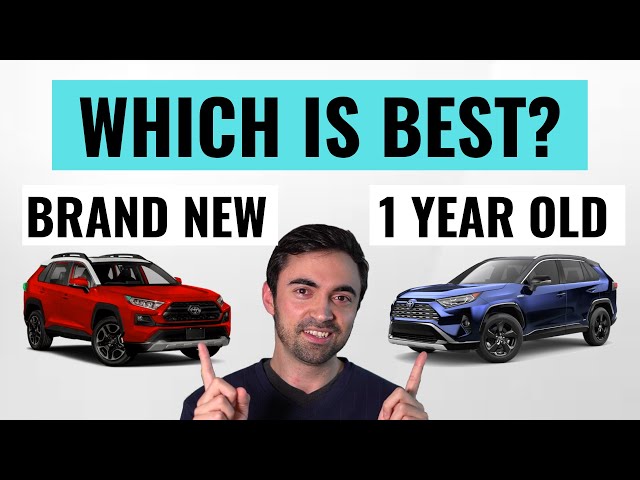IS IT BETTER TO BUY A NEW OR USED CAR?
When considering the purchase of a car, one of the fundamental decisions is whether to buy new or used. Each option has its own set of advantages and potential drawbacks, and the best choice depends on a variety of factors, including budget, personal preferences, and long-term goals. Understanding the pros and cons of both new and used cars can help you make an informed decision that aligns with your financial situation and lifestyle.
Advantages of Buying a New Car
Latest Features and Technology: New cars come equipped with the latest technology and features. This includes advanced safety systems, infotainment options, fuel-efficient engines, and the most up-to-date designs. For many buyers, the appeal of having the newest technology and improved performance is a significant draw.
Full Warranty: One of the biggest benefits of purchasing a new car is the manufacturer’s warranty, which typically covers major repairs and maintenance for several years or a set number of miles. This warranty provides peace of mind, knowing that unexpected repairs are less likely to be your financial responsibility.
Customizable Options: When buying new, you have the option to customize your vehicle to your preferences. You can choose the color, trim level, and add-on features, ensuring that the car meets all your specific needs and desires.
Higher Reliability: New cars are less likely to experience mechanical issues or require repairs shortly after purchase. This reliability can be reassuring, especially if you plan to use the vehicle for commuting or long trips.
Improved Fuel Efficiency: Newer models generally feature more fuel-efficient engines and advanced technology that can help reduce fuel consumption. This can lead to lower running costs and contribute to a smaller environmental footprint.
Disadvantages of Buying a New Car
Depreciation: New cars lose value quickly. On average, a new car can depreciate by 20% to 30% within the first year of ownership. This means that if you plan to sell the car in a few years, you might not get back the full amount you paid.
Higher Cost: New cars come with a higher price tag compared to used cars. The initial cost includes not only the price of the vehicle but also higher insurance premiums and taxes. This can be a significant financial burden for many buyers.
Potential for Additional Costs: New cars may come with additional costs such as dealer fees, optional add-ons, and higher registration fees. These extra expenses can increase the overall cost of purchasing a new vehicle.
Advantages of Buying a Used Car
Lower Purchase Price: The most significant advantage of buying a used car is the lower purchase price. Depreciation has already taken a substantial chunk out of the vehicle’s value, which means you can often get a higher-end model for a fraction of the cost of a new car.
Slower Depreciation: Used cars depreciate at a slower rate than new cars. This means that if you decide to sell the car in a few years, you might retain a larger portion of its value compared to a new vehicle.
Lower Insurance Costs: Insurance premiums for used cars are generally lower than for new cars. Since the replacement value is lower, insurance companies often charge less to cover a used vehicle.
Extended Warranties: Many used cars come with extended warranties or certified pre-owned programs offered by manufacturers or dealerships. These warranties can provide some of the benefits of a new car warranty, offering protection against unexpected repairs.
Reduced Registration Fees: In many areas, registration fees are based on the car’s value or age. Used cars often come with lower registration fees, further reducing the overall cost of ownership.
Disadvantages of Buying a Used Car
Potential for Hidden Problems: Used cars may have hidden mechanical or cosmetic issues that are not immediately apparent. While a thorough inspection and vehicle history report can mitigate this risk, there is always a chance of unforeseen problems.
Limited Warranty: Used cars generally have shorter warranties, and some may not come with any warranty at all. This means that you might have to cover repair costs out of pocket if issues arise after the purchase.
Outdated Features: Depending on the age of the used car, it might lack the latest technology, safety features, and design elements. If having the most current features is important to you, this could be a significant drawback.
Higher Maintenance Costs: As cars age, they may require more frequent maintenance and repairs. While the initial cost is lower, ongoing maintenance for an older vehicle can sometimes offset the savings.
Limited Customization: When buying used, you are limited to the vehicle’s existing configuration. You cannot choose specific options or features, which means you may have to compromise on some aspects of the car.
Making the Decision
When deciding between a new or used car, consider the following factors:
- Budget: Assess your financial situation to determine what you can afford. Include not just the purchase price but also insurance, maintenance, and potential repair costs.
- Driving Needs: Think about how you will use the car. If you need a reliable vehicle with the latest features for daily commuting, a new car might be worth the investment. For occasional use or a lower budget, a used car could be a practical choice.
- Long-Term Goals: Consider your long-term plans. If you intend to keep the car for many years, a new car might offer better value in terms of reliability and warranty. If you plan to change vehicles more frequently, a used car could be a cost-effective solution.
In conclusion, both new and used cars offer distinct advantages and disadvantages. The best choice depends on your financial situation, personal preferences, and how you plan to use the vehicle. By weighing the pros and cons and considering your unique needs, you can make an informed decision that aligns with your goals and budget.
